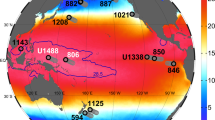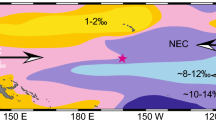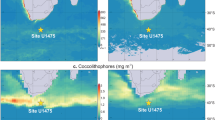Abstract
A SERIES of C37–39 alkenones synthesized by prymnesiophyte algae is commonly preserved in marine sediments, and can be used for estimating past sea surface temperatures (SSTs)1,2. Here we present an alkenone analysis of sediments taken from the central equatorial Pacific Ocean (core W8402A-14GC; 0° 57′N, 138° 57′W) which shows that SST varied slightly (<2°C) but coherently with Milankovitch insolation cycles over the past 250 kyr. The in-phase response of the SST to the precessional component of insolation indicates that this part of the SST time series may be driven by changes in local trade-wind strength, and the longer 100-kyr eccentricity component indicates a response to basin-wide South Pacific winds. Using a simple heat-balance model, we use our palaeotemperature record to constrain the upwelling rates that have occurred in the past. Similar SST records from the eastern Pacific could constrain the horizontal advection component of the SST record and allow for better estimates of upwelling. Upwelling and palaeoproductivity then could be compared to determine whether changes in equatorial nutrient levels actually cause equivalent changes in productivity.
This is a preview of subscription content, access via your institution
Access options
Subscribe to this journal
Receive 51 print issues and online access
$199.00 per year
only $3.90 per issue
Buy this article
- Purchase on Springer Link
- Instant access to full article PDF
Prices may be subject to local taxes which are calculated during checkout
Similar content being viewed by others
References
Brassell, S. C., Eglinton, G., Marlowe, I. T., Pflaumann, U. & Sarnthein, M. Nature 320, 129–133 (1986).
Prahl, F. G. & Wakeman, S. G. Nature 330, 367–369 (1987).
Prahl, F. G., Muehlhausen, L. A. & Lyle, M. Paleoceanography 4, 495–510 (1989).
Murray, D. W. thesis, Oregon State Univ. (1987).
Prahl, F. G., deLange, G. J., Lyle, M. & Sparrow, M. A. Nature 341, 434–437 (1989).
Imbrie, J. Milankovitch and Climate, Part I (eds Berger, A. L. et al.) 269–305 (Reidel, Dordrecht, 1984).
Berger, A. L. Ouat. Res. 9, 139–167 (1978).
Flöhn, H. Climate and Weather, 111 (McGraw-Hill, New York, 1978).
Bryden, H. L. & Brady, E. C. J. phys. Ocean. 15, 1255–1273 (1985).
CLIMAP Project Members Geol. Soc. Am. Map and Chart Ser. MC-36 (1981).
Chavez, F. P., Buck, K. R. & Barber, R. T. Deep-Sea Res. 37, 1733–1752 (1990).
Martin, J. H. Palaeoceanography 5, 1–13 (1990).
Sarnthein, M., Winn, K., Duplessy, J. C. & Fontugne, M. R. Paleoceanography 3, 361–399 (1988).
Mix, A., Nature 335, 541–544 (1989).
Lyle, M. et al. Paleoceanography 3, 39–59 (1988).
Lyle, M. Nature 335, 529–532 (1988).
Author information
Authors and Affiliations
Rights and permissions
About this article
Cite this article
Lyle, M., Prahl, F. & Sparrow, M. Upwelling and productivity changes inferred from a temperature record in the central equatorial Pacific. Nature 355, 812–815 (1992). https://doi.org/10.1038/355812a0
Received:
Accepted:
Issue Date:
DOI: https://doi.org/10.1038/355812a0
This article is cited by
-
Bloom without fertilizer
Nature Geoscience (2008)
-
High-resolution climate simulation of the last glacial maximum
Climate Dynamics (2008)
-
Eastern Pacific cooling and Atlantic overturning circulation during the last deglaciation
Nature (2006)
-
Glacial/interglacial changes in the East Australian current
Climate Dynamics (2006)
-
High-latitude influence on the eastern equatorial Pacific climate in the early Pleistocene epoch
Nature (2004)
Comments
By submitting a comment you agree to abide by our Terms and Community Guidelines. If you find something abusive or that does not comply with our terms or guidelines please flag it as inappropriate.



